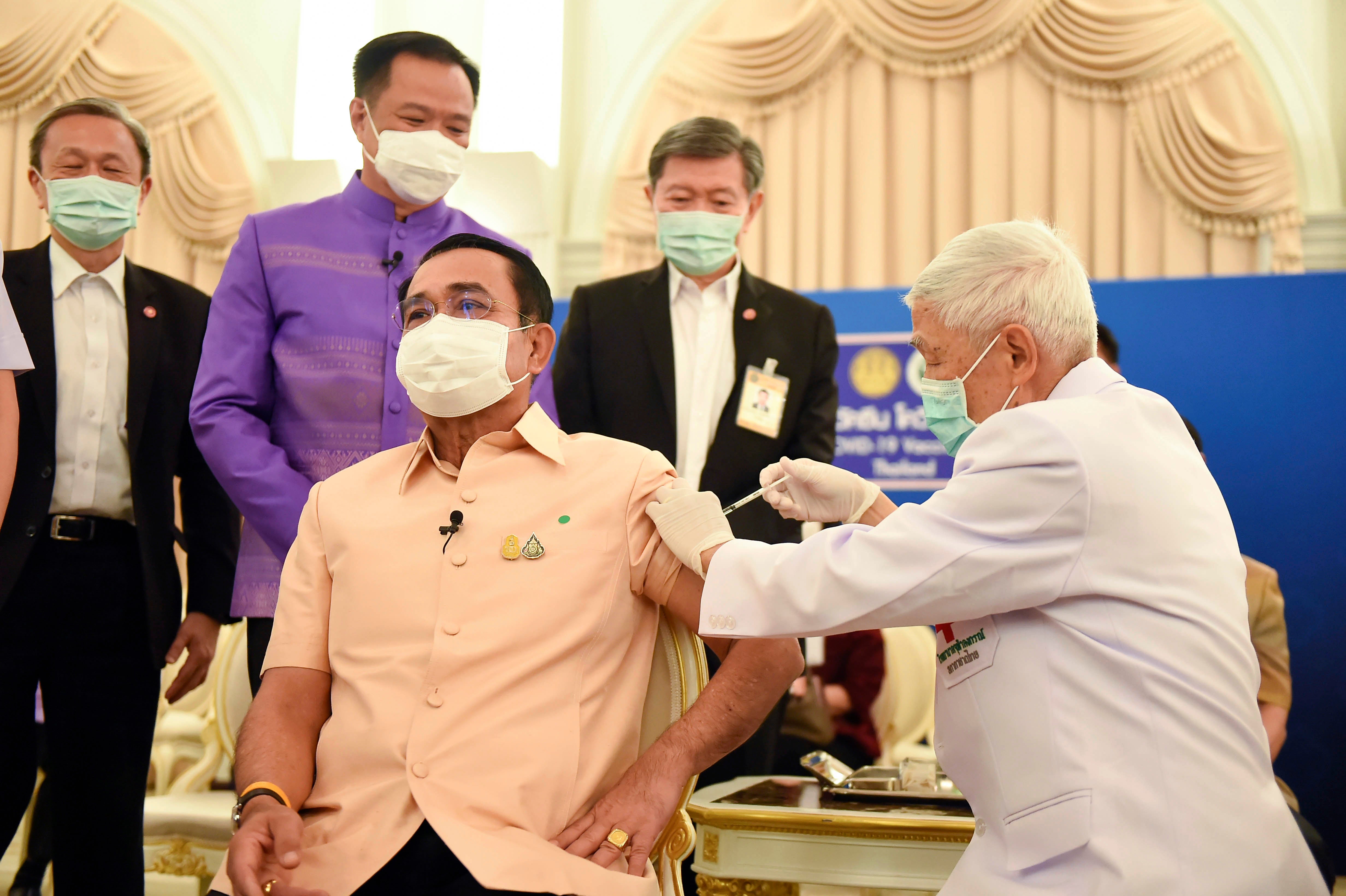Thailand PM gets AstraZeneca jab, 1 Asian country suspends
Thailand’s prime minister has received a shot of the COVID-19 vaccine manufactured by AstraZeneca, as much of Asia shrugged off concerns about reports of blood clots in some recipients in Europe, saying that so far there is no evidence to link the two

Your support helps us to tell the story
From reproductive rights to climate change to Big Tech, The Independent is on the ground when the story is developing. Whether it's investigating the financials of Elon Musk's pro-Trump PAC or producing our latest documentary, 'The A Word', which shines a light on the American women fighting for reproductive rights, we know how important it is to parse out the facts from the messaging.
At such a critical moment in US history, we need reporters on the ground. Your donation allows us to keep sending journalists to speak to both sides of the story.
The Independent is trusted by Americans across the entire political spectrum. And unlike many other quality news outlets, we choose not to lock Americans out of our reporting and analysis with paywalls. We believe quality journalism should be available to everyone, paid for by those who can afford it.
Your support makes all the difference.Thailand s prime minister received a shot of the COVID-19 vaccine manufactured by AstraZeneca on Tuesday, as much of Asia shrugged off concerns about reports of blood clots in some recipients in Europe, saying that so far there is no evidence to link the two.
AstraZeneca has developed a manufacturing base in Asia, and the Serum Institute of India, the world’s largest vaccine maker, has been contracted by the company to produce a billion doses of the vaccine for developing nations. Hundreds of millions more are to be manufactured this year in Australia, Japan, Thailand and South Korea.
“There are people who have concerns," Thai Prime Minister Prayuth Chan-ocha said after he received the first dose of the AstraZeneca vaccine. "But we must believe doctors, believe in our medical professionals."
Thailand last week was the first country outside Europe to temporarily suspend using the AstraZeneca vaccine. Indonesia followed on Monday, saying it was waiting for a full report from the World Health Organization regarding possible side effects.
But Thailand's health authorities decided to go ahead with AstraZeneca, with Prayuth and members of his Cabinet receiving the first shots.
A large number of European countries — including Germany, France, Italy and Spain — suspended use of the AstraZeneca vaccine Monday over reports of dangerous blood clots in some recipients, though the company and international regulators say there is no evidence the shot is to blame.
The EU’s drug regulatory agency called a meeting for Thursday to review experts’ findings on the AstraZeneca shot and to decide whether action needs to be taken.
Other countries in the Asian region said they would press ahead with vaccination programs.
Australian Health Minister Greg Hunt said his country would not suspend vaccinations. Australia has vaccinated about 200,000 people so far and plans to import and manufacture 70 million vaccine doses from AstraZeneca.
“The government clearly, unequivocally, absolutely supports the AstraZeneca rollout, clearly, unequivocally, absolutely. And the reason why is very simple — it will help save lives and protect lives, and it’s done so on the basis of the medical advice," Hunt told Parliament
Australia's chief medical officer, Paul Kelly, said there was no evidence so far that the vaccine causes blood clots.
"Blood clots happen, they happen in Australia fairly commonly," he said. "But, from my perspective, I do not see that there is any specific link between the AstraZeneca vaccine and blood clots, and I’m not alone in that opinion.”
By far the largest user of the AstraZeneca vaccine is India.
India is using two vaccines — the AstraZeneca shot made by Serum Institute of India, and another one by Indian vaccine maker Bharat Biotech — to immunize its vast population. Of the more than 25.6 million people in India who have received at least one shot of a vaccine, over 23.4 million have received the AstraZeneca shot, according to government data.
Health officials told the Press Trust of India news agency on Saturday that a total of 234 adverse events, including 71 deaths, had been reported after receiving either vaccine — but that no causal link had been found. The government is now reviewing the cases for a final assessment.
Serum Institute of India, the world’s largest vaccine maker, has been contracted by AstraZeneca to make a billion doses of vaccine for developing nations. By March 4, India had exported over 48.1 million doses of vaccine, including 11.9 million doses to COVAX and 28.8 million doses as commercial exports, according to government data.
Meanwhile, health activists and medical ethics experts in India have warned that India’s systems for monitoring any harmful side effects are too lax.
With the exception of a few countries, such as Singapore and India, Asian nations have been quite slow in getting their populations vaccinated. Most of the nations, including Australia, New Zealand and Thailand, have been relatively successful in containing the spread of COVID-19.
Thailand has ordered just enough vaccine from AstraZeneca and China to cover about half its population this year and has so far managed to inoculate around 50,000 people in high-risk groups.
___
Associated Press journalists Chalida Ekvitthayavechnukul in Bangkok, Rod McGuirk in Canberra, Australia, Moussa Moussa in Sydney, Niniek Karmini in Jakarta, Indonesia, Aniruddha Ghosal in New Delhi, Kim Tong-hyung in Seoul, South Korea, and Mari Yamaguchi in Tokyo contributed to this report